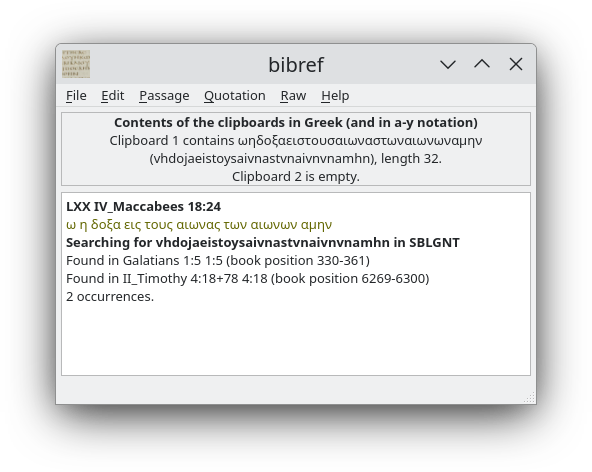5 February 2025
Deuterocanonical books in the bibref project
In my previous blog entry, there was an announcement on
extending the statement database with LXX-StatResGNT connections in the
bibref project. Now here are some news
about a major update of the LXX module database.
The SWORD project updated the text
of Septuagint in their module database more than 2 years ago. I was unhappy with that
new version because it used a different versification system. As a result, many verses
in the Old Testament had a different numbering, for example, Psalm 40:1 in the old
system appears as Psalm 39:2 in the new version. In general, this is unfortunately not as
simple as one thinks, because certain Psalms are shifted by this schema, but others not
(or yet in another way). Similar problems occur with other books like Exodus,
Isaiah, Jeremiah, and so on. This issue is well-known among Bible software developers:
it is called versification and usually handled by Bible programs to some extent.
My first idea was to keep with the old version and ask the SWORD maintainers to
allow accessing the old version publicly as well, maybe under a different name, but
it became soon clear
that it would not be the optimal way. So finally I decided to go ahead and update
the whole program to handle the new version correctly, including the databases.
Now the new bibref version is available at
GitHub.
As a side effect, the new LXX module contains a couple of deuterocanonical books from the Septuagint.
These include I Esdras, Judith, Tobit, the four Maccabees books, Wisdom, Sirach, Psalms of Solomon,
Baruch, Epistle of Jeremiah, Susanna, Bel and the Dragon, and Odes. From the research perspective,
they have just a secondary importance, because no known quotation in the New Testament refers to
any of these books. During the years, however, I learned that such statements should always be accepted with doubt:
So I did try an attempt to look for possible texts that are from the deuterocanonical books and
mentioned in the New Testament.
One possible method is to use the getrefs command in bibref. It can identify unique texts
in LXX that are present in the New Testament as well. A batch program
can collect all possible occurrences. To do that, the program requires a reasonably big amount
of memory, so my laptop with 16 GB stopped processing the second half of Genesis because of
being low on memory. Instead, I re-ran the script on my university server (with 24 GB RAM) and after
a couple of hours, the full database was obtained.
The result is quite clear: The first 115 entries, sorted by length (longer one first), are from canonical Bible books
like Psalms, Isaiah, Deuteronomy, Proverbs, Exodus, Joel, Hosea, Genesis, Amos, Jonah, Habakkuk.
The 116th entry is from I Maccabees, the passage 2:69+18 2:70-119, it is verbatim the same text
that appears in SBLGNT Acts 13:36+52 13:36-14:
“και προσετεθη προς τους πατερας αυτου” (“and was added to the fathers of him”),
on 35 Greek letters. The New Testament text is in the middle of Paul's speech in a synagogue in
Pisidian Antioch, and it seems clear that he just used a longer expression that was probably well-known
for him, eventually since he also knew the Maccabees books. That is, I Maccabees is not raised
here to the same level of the canonical books, but eventually, Paul's phrasing explains that
the language and formalizations of I Maccabees were well-accepted in the 1st century AD.
The following entries also include Leviticus, until, on the 148th entry, another verbatim text
can be identified, this time between I Maccabees 11:1+41 11:1-94 and Hebrews 11:12+76 11:12-12,
on 32 letters: “ως η αμμος η παρα το χειλος της θαλασσης” (“as the sand by the lip of the sea”).
Again, this is a kind of artistic expression of the author of Hebrews, but it can be assumed
that for him, the Maccabees books were relevant, however, not at the same level like for the
canonical books.
The next non-canonical entries (160th-162nd) are between I Maccabees 3:45+37 3:45-134
and Acts 9:28+13 9:28-47 (“εισπορευομενος και εκπορευομενος”, “entering in and going out”),
IV Maccabees 18:24 18:24-1 and Galatians 1:5 1:5-1 and
II Timothy 4:18+78 4:18-1 (“η δοξα εις τους αιωνας των αιωνων αμην”, “the glory to the
ages of the ages, amen”), on 31 letters. It seems that Luke and Paul both used similar phrases
that appear in the Maccabees books, here, the last phrase is actually in the last verse
of the last Maccabees book. This is perhaps not just a random match.

A screenshot of the new version of the bibref program. It shows that the match is actually 32-letter long, but, for some technical issues, the last letter was not identified (this issue should be fixed in a future version).
Instead of continuing with other examples, we point the reader to the whole database
in CSV format, available here. The file can be imported to any spreadsheet software
(warning, it contains more than 125000 lines!), and then, by ordering the table by column I
(the length of the verbatim match), the study can be continued by anyone. In some other
entries one will find verbatim passages from Judith and Baruch (on lengths 27), and from
other books (on shorter lengths).
We can conclude that deuterocanonical books were probably an important part of Christian
literature in the 1st century AD, but their importance is much below the above mentioned
canonical books. Here, only verbatim match was checked, but, of course, it may also
be interesting to find fuzzy matches (where some letters are missing or eventually changed).
Anyway, checking for verbatim matches gives a good overview of matching in general,
since there is a substantial amount of passages that are indeed quoted letter by letter.
Verbatim quotations from the canonical books are often used to argue for the divine
origin of Jesus Christ. The canonical books prophesized His coming and His work many centuries
before those actually happened. This seems to be the most relevant argument why we
are interested in verbatim and almost-verbatim matches: to prove that the person of Jesus
is not just a random event in history. No, His presence was completely planned,
and this can be clearly followed in the many connections between the Old Testament and
New Testament texts.
Acknowlegment. Ildikó Vargáné Kiss kindly presented me a couple of Bible study books
last summer. Among them, there is a Hungarian
edition of the texts of the deuterocanonical
books, with some comments by the editors. I used this book with good success in my
current research.
Entries on topic internal references in the Bible
- Web version of bibref (12 January 2022)
- Order in chaos (17 January 2022)
- Reproducibility and imperfection (20 January 2022)
- A student of Gamaliel's (23 January 2022)
- Non-literal matches in the Romans (26 January 2022)
- Literal matches: minimal uniquity and maximal extension (31 January 2022)
- Literal matches: the minunique and getrefs algorithms (1 February 2022)
- Non-literal matches: Jaccard distance (2 February 2022)
- Non-literal matches in the Romans: Part 2 (3 February 2022)
- A summary on the Romans (5 February 2022)
- The Psalms (6 February 2022)
- The Psalms: Part 2 (7 February 2022)
- A classification of structure diagrams (15 February 2022)
- Isaiah: Part 1 (19 February 2022)
- Isaiah: Part 2 (26 February 2022)
- Isaiah: Part 3 (2 March 2022)
- Isaiah: Part 4 (7 March 2022)
- Isaiah: Part 5 (15 March 2022)
- Isaiah: Part 6 (23 March 2022)
- Isaiah: Part 7 (30 March 2022)
- A summary (7 April 2022)
- On the Wuppertal Project, concerning Matthew (17 July 2022)
- Matthew, a summary (25 July 2022)
- Isaiah, a second summary (31 July 2022)
- Long false positives (23 August 2022)
- A general visualization (25 August 2022)
- Stephen's defense speech (19 September 2022)
- Statistical Restoration Greek New Testament (31 July 2023)
- Qt version of bibref (11 March 2024)
- Statements on Bible references (5 August 2024)
- Statements on Bible references: Part 2 (2 January 2025)
- Statements connecting LXX and StatResGNT (23 January 2025)
- Deuterocanonical books in the bibref project (5 February 2025)
- Update to LXX 3.0: Part 2 (7 February 2025)
- An allusion on Palm Sunday (29 March 2025)
- Module LXX can be upgraded from 3.0 to 3.2 just with little pain (14 August 2025)
- bibref: German language support (23 August 2025)
- Statement diagrams based on LXX 3.2 (24 December 2025)

|
Zoltán Kovács Linz School of Education Johannes Kepler University Altenberger Strasse 69 A-4040 Linz |